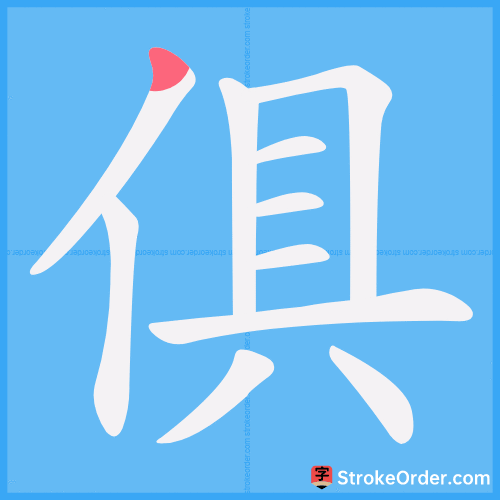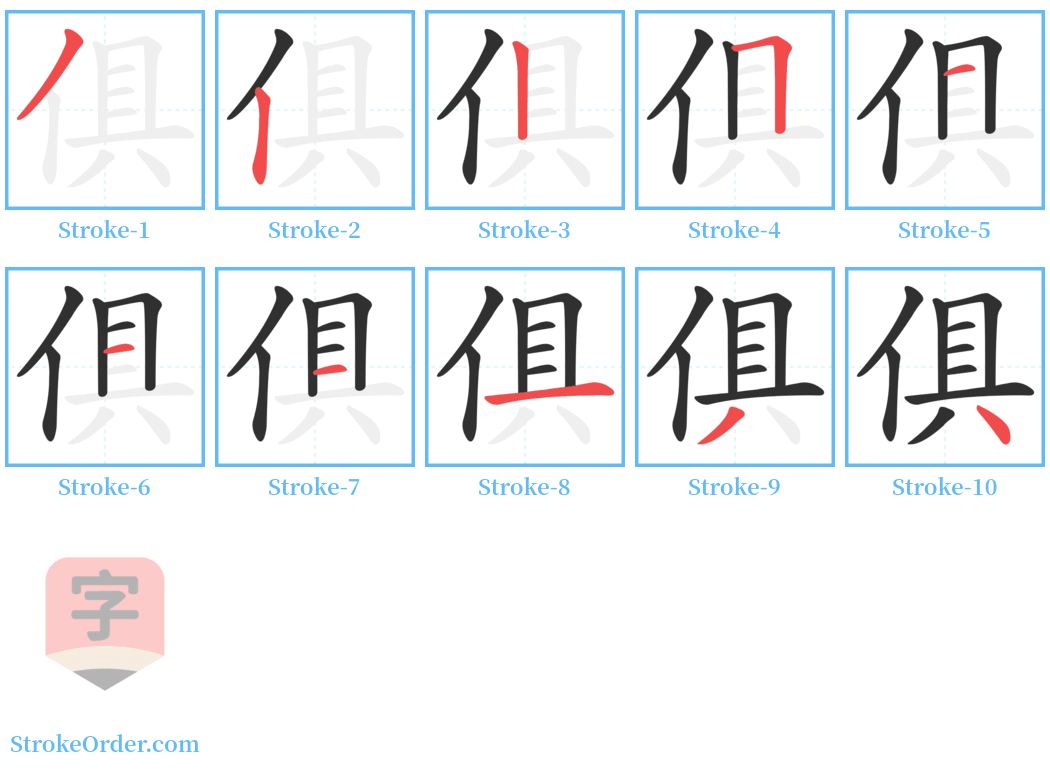俱 Stroke Order
Animated Stroke Order of 俱

Stroke Order Diagrams for 俱

Step-by-Step Handwriting Guide for 俱

Learn to Write Chinese Characters with Video Tutorials
Watch the video of writing the Chinese character "俱", learn the correct stroke order (笔顺) of the character "俱", and master the standard way of writing the character "俱".
Free Printable Handwriting Practice with Stroke Order: 俱
Printable Writing Practice Worksheet of "俱" in Portrait Orientation (Tian Zi Ge)

Printable Writing Practice Worksheet of "俱" in Landscape Orientation (Tian Zi Ge)

Information of 俱
Pinyin
jù、 jū
Radical
亻
Strokes
10 strokes
Usage
★★★★★
Definition
entirely / without exception, a social club
俱 [jù]
Meaning:
1. 全,都 (All; completely):
- 百废俱兴 (All industries revived).
- 声色俱厉 (Both sound and color are strong).
2. 一起;在一起 (Together; in company):
- 俱乐部 (Club).
- 君与俱来 (You came along with me).
Function:
1. 〈动〉 (Verb):
- 本义: 走在一起,在一起 (Original meaning: To walk together; to be together).
- 造字法: 形声。从人,具声 (Character formation: Phono-semantic; from 'person', '具' for sound).
- 同本义 (In the company of; along with).
- 等同 (Equally; alike; same).
2. 〈副〉 (Adverb):
- 皆; 全; 都 (All; completely).
- 一起; 一同 (Together; in company).
Examples of usage:
1. 同本义:
- 《说文》: 俱,皆也。(In Shuowen: 俱 means all).
- 《战国策·齐策》: 而仪与之俱。(Notes: "与之偕也.").
- 《庄子·天运》: 道可载而与之俱也。(The way can carry and go along with it).
- 《史记·魏公子列传》: 臣客屠者朱亥可与俱。(The minister’s guest, butcher Zhu Hai, can accompany).
- 《汉书·李广苏建传》: 百余人俱。(More than a hundred people together).
- 与李陵俱。
- 《世说新语·自新》: 处与之俱。(Staying together with it).
- 清· 袁枚《黄生借书说》: 使与书俱。(Making it accompany the book).
2. 等同:
- 《素问·三部九侯论》: 所谓后者应不俱也。(The latter should not be equal).
- 《论衡》: 伊尹、箕子才俱也,伊尹为相,箕子为奴。(Yi Yin and Ji Zi are equally talented, but Yi Yin is the prime minister while Ji Zi is a slave).
3. 皆; 全; 都:
- 《史记·廉颇蔺相如列传》: 其势不俱生。(Their power does not coexist).
- 诸葛亮《出师表》: 俱为一体。(All are one body).
- 晋· 干宝《搜神记》: 三首俱烂。(All three heads are rotten).
- 唐· 杜甫《春夜喜雨》: 野径云俱黑。(The wild path is all dark with clouds).
- 《资治通鉴》: 战具俱办。(All weapons are prepared).
4. 一起; 一同:
- 《史记·魏公子列传》: 父子俱在军中。(Father and son are both in the army).
- 《资治通鉴》: 俱诣孙权。(All go to Sun Quan).
- 水陆俱下。(Both water and land).
- 《史记·廉颇蔺相如列传》: 与璧俱碎。(Both broken with the jade).
- 《三国志·诸葛亮传》: 君与俱来。(You come along with).
Additional meanings:
- 姓 (A surname).
- 上述[一]的另一种读音 (Another pronunciation of the above mentioned [one]).
- 上述[一]的另一种读音 (Another pronunciation of the above mentioned [one]).
Everything is ready. / complete with everything needed / Everything has been arranged. / Everything was got ready.
Input Method for 俱
Pinyin
ju4
Wubi
whwy
Cangjie
obmc
Zhengma
nlo
Four Corner
27281
Unicode
U+4ff1
Same Pronunciation Characters